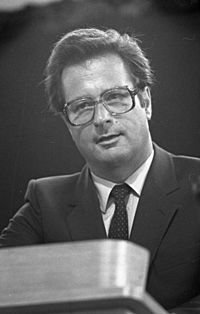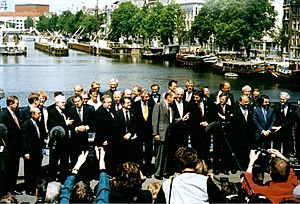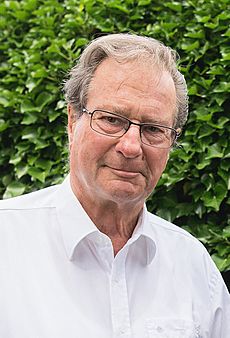Klaus Kinkel facts for kids
Quick facts for kids
Klaus Kinkel
|
|
|---|---|

Kinkel as President of the Federal Intelligence Service in 1982
|
|
| Vice-Chancellor of Germany | |
| In office 21 January 1993 – 26 October 1998 |
|
| Chancellor | Helmut Kohl |
| Preceded by | Jürgen Möllemann |
| Succeeded by | Joschka Fischer |
| Leader of the Free Democratic Party | |
| In office 11 June 1993 – 10 June 1995 |
|
| Preceded by | Otto Graf Lambsdorff |
| Succeeded by | Wolfgang Gerhardt |
| Minister of Foreign Affairs | |
| In office 18 May 1992 – 26 October 1998 |
|
| Chancellor | Helmut Kohl |
| Preceded by | Hans-Dietrich Genscher |
| Succeeded by | Joschka Fischer |
| Minister of Justice | |
| In office 18 January 1991 – 18 May 1992 |
|
| Chancellor | Helmut Kohl |
| Preceded by | Hans A. Engelhard |
| Succeeded by | Sabine Leutheusser-Schnarrenberger |
| President of the Federal Intelligence Service | |
| In office 1 January 1979 – 26 December 1982 |
|
| Chancellor | Helmut Schmidt Helmut Kohl |
| Preceded by | Gerhard Wessel |
| Succeeded by | Eberhard Blum |
| Member of the Bundestag for North Rhine-Westphalia |
|
| In office 10 November 1994 – 17 October 2002 |
|
| Preceded by | multi-member district |
| Succeeded by | multi-member district |
| Constituency | FDP List |
| Personal details | |
| Born | 17 December 1936 Metzingen, Nazi Germany |
| Died | 4 March 2019 (aged 82) Sankt Augustin, Germany |
| Political party | Free Democratic Party (1991–2019) |
| Spouse |
Ursula Kinkel (m. 1962)
|
| Children | 4 |
| Residence | Sankt Augustin |
| Alma mater | University of Tübingen (no degree) University of Bonn University of Cologne (Dr. iur.) |
| Occupation |
|
Klaus Kinkel (17 December 1936 – 4 March 2019) was an important German statesman and civil servant. He also worked as a diplomat and a lawyer. Kinkel served as the Minister of Foreign Affairs from 1992 to 1998. He was also the Vice-Chancellor of Germany from 1993 to 1998. Both of these roles were in the government led by Helmut Kohl.
Kinkel spent many years working for the government. He was a close helper to Hans-Dietrich Genscher, another famous German politician. Kinkel led the Federal Intelligence Service from 1979 to 1982. Later, he became a state secretary in the Federal Ministry of Justice from 1982 to 1991. In 1991, he became the Federal Minister of Justice. Soon after, he joined the Free Democratic Party (FDP).
In 1992, Kinkel became the Foreign Minister. In 1993, he also took on the roles of Vice Chancellor of Germany and leader of the Free Democratic Party. He left the government in 1998 after his party lost an election. Kinkel was a member of the Bundestag (Germany's parliament) from 1994 to 2002. After his political career, he worked as a lawyer and helped many charities.
Contents
Early Life and Education
Klaus Kinkel was born in Metzingen, Germany, on December 17, 1936. He grew up in a Catholic family in Hechingen. His father, Ludwig Leonhard Kinkel, was a medical doctor. Klaus was a good tennis player when he was young.
He finished high school in 1956. Then, he studied medicine for a short time. After that, he studied law at the universities of Tübingen and Bonn. He was part of a Catholic student group called A.V. Guestfalia Tübingen. Kinkel passed his law exams and earned a doctorate in law in 1964 from the University of Cologne.
Working for the Government
In 1965, Kinkel started working for the Federal Ministry of the Interior. He focused on keeping people safe. He also worked in a local government office in Balingen for a year. In 1968, he returned to the national ministry.
From 1970 to 1974, he was the personal secretary and speechwriter for Minister Hans-Dietrich Genscher. He later became the head of Genscher's office. When Genscher became Foreign Minister in 1974, Kinkel took on important roles in the Federal Foreign Office.
Leading the Intelligence Service
From 1979 to 1982, Klaus Kinkel was the president of the Federal Intelligence Service (BND). This is Germany's foreign intelligence agency. He helped to rebuild trust in the BND after some problems. He also helped the BND gather more information from outside Europe.
State Secretary in Justice Ministry
From 1982 to 1991, Kinkel worked as a state secretary in the Federal Ministry of Justice. This is a high-ranking position in the government.
Political Career
As Justice Minister
Kinkel served as the Federal Minister of Justice from 1991 to 1992. During this time, he pushed for the former East German leader, Erich Honecker, to face trial. He also talked with the Red Army Faction, a terrorist group, and convinced them to stop their violent actions.
Foreign Minister and Party Leader
In 1992, Klaus Kinkel became Germany's Foreign Minister. This was a surprise decision by his party. He played a big part in creating the International Criminal Tribunal for the former Yugoslavia. This court was set up to try people for serious crimes during the wars in the Balkans. He also wanted Germany to have a permanent seat on the United Nations Security Council.
Under Kinkel's leadership, Germany's parliament agreed in 1993 to let German troops join international peacekeeping operations. These operations are approved by the United Nations and other groups. This was a big change for Germany after World War II. Germany also started destroying its stockpiles of heavy weapons. This was part of a treaty to reduce military equipment in Europe.
Kinkel strongly supported European integration. This means countries in Europe working more closely together. He helped Germany approve the Treaty of Maastricht, which created the European Union. He also believed that the EU should have its own military ability. Kinkel wanted the EU to expand and include more countries.
From 1993, Kinkel was also the Vice-Chancellor of Germany. From 1993 to 1995, he was the leader of the Free Democratic Party (FDP). After his party did not do well in several elections, Kinkel decided not to run for party chairman again. He left his roles as Foreign Minister and Vice-Chancellor in 1998.
In the German Parliament
Kinkel was a member of the Bundestag, which is Germany's national parliament. He served in the Bundestag from 1994 to 2002.
Life After Politics
After leaving government in 1998, Klaus Kinkel worked as a lawyer. He was also involved in many charity and business activities. For example, he was on the board of trustees for the Bundesliga Foundation. He also served on the advisory board for Lehman Brothers and EnBW.
From 2003 to 2014, he was the first chairman of the executive board for the Deutsche Telekom Foundation. In 2011, he represented the German government at a funeral in Saudi Arabia. In 2016, Kinkel was chosen to lead a new ethics commission for the German Football Association (DFB). This commission helps the DFB be more open and honest.
See also
 In Spanish: Klaus Kinkel para niños
In Spanish: Klaus Kinkel para niños
 | Calvin Brent |
 | Walter T. Bailey |
 | Martha Cassell Thompson |
 | Alberta Jeannette Cassell |



